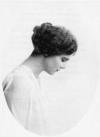Career
Other info : Furtherreading | Bibliography
Poet and novelist. Vanity Fair, poetry editor, 1923-25; Literary Guild, editor, 1926-28; New Republic, contributing editor, 1926-28.
Elinor Wylie's literary friends encouraged her to submit her verse to Poetry magazine. Poetry published four of her poems, including what became "her most widely anthologized poem, 'Velvet Shoes'", in May 1920. With Benét now acting as her informal literary agent, "Wylie left her second husband and moved to New York in 1921". The Dictionary of Literary Biography (DLB) says: "She captivated the literary world with her slender, tawny-haired beauty, personal elegance, acid wit, and technical virtuosity."
In 1921, Wylie's first commercial book of poetry, Nets to Catch the Wind, was published. The book, "which many critics still consider to contain her best poems," was an immediate success. Edna St. Vincent Millay and Louis Untermeyer praised the work. The Poetry Society awarded her its Julia Ellsworth Ford Prize.
In 1923 she published Black Armor, which was "another successful volume of verse". The New York Times enthused: "There is not a misplaced word or cadence in it. There is not an extra syllable."
1923 also saw the publication of Wylie's first novel, Jennifer Lorn, to considerable fanfare. Van Vechten "organized a torchlight parade through Manhattan to celebrate its publication". She would write "four historical novels widely admired when first published, although interest in them diminished in the masculine era of the 1940s and 50s".
She worked as the poetry editor of Vanity Fair magazine between 1923 and 1925. She was an editor of Literary Guild, and a contributing editor of The New Republic, from 1926 through 1928.
Wylie was an "admirer of the British Romantic poets, and particularly of Shelley, to a degree that some critics have seen as abnormal". "A friend claimed she was 'positively dotty' about Shelley, not just making him her model in art and life but on occasion actually 'seeing' the dead poet." She wrote a 1926 novel, The Orphan Angel, in which "the great young poet is rescued from drowning off an Italian cape and travels to America, where he encounters the dangers of the frontier."
By the time of Wylie's third book of poetry, Trivial Breath in 1928, her marriage with Benét was also in trouble, and they had agreed to live apart. She moved to England and fell in love with the husband of a friend, Henry de Clifford Woodhouse, to whom she wrote a series of 19 sonnets which she published privately in 1928 as Angels and Earthly Creatures (also included in her 1929 book of the same name).
Elinor Wylie died of a stroke at Benét's New York apartment, while working with him preparing the 1929 Angels and Earthly Creatures for publication.






